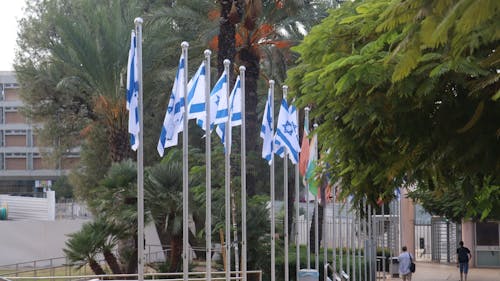LETTER TO THE EDITOR: Proposed academic boycotts, BDS diminishes U., harms learning, creates social divisions

We are Rutgers faculty from a range of academic disciplines at the New Brunswick, Camden and Newark campuses. We write to express our profound concern over the upcoming referendum put forward by the Rutgers University Student Assembly, which calls for the University to boycott, divest from and sanction (BDS) the State of Israel and terminate its partnership with Tel Aviv University.
While some well-meaning people gravitate to the BDS movement believing that it offers a means for advancing social justice and peace in the Middle East, true peace activists seek ways to speak and work together with the goal of bringing governments and societies into dialogue and coexistence. In contrast, the BDS movement is divisive and illiberal.
Reports have documented that BDS activism, including referenda like these, coarsen campus discourse, promote prejudice and hate and demean and marginalize Jewish and Zionist students. Indeed, research shows that pro-BDS student activism leads to a marked increase in antisemitic incidents on campus.
A university, at its best, promotes learning and inquiry, dialogue and debate, research and innovation. Academic boycotts, which blacklist faculty and students due to nationality, political views and ethnicity, are inherently detrimental to these ideals and to the principles that define the academy: academic freedom, the free exchange of ideas and a community united in learning, exploration and growth.
Suspending Rutgers' partnership with Tel Aviv University would unfairly deny students and faculty — both those at Tel Aviv University and at Rutgers — important educational opportunities and opportunities to hear and be heard, to build bridges and partnerships that advance scholarship and learning.
Commitment to our University's core values of "academic excellence that's both accessible and affordable, building a beloved community where every single member of the University has a voice and serving the common good while making a meaningful difference in the world" requires a rejection of these divisive referenda.
Academic boycotts are inimical to the inclusive, tolerant and respectful learning community to which the University aspires. Our values call on us to reach out, listen and engage — not to isolate, segregate and demean.
Our role as educators and the role of Rutgers as an educational institution is to advance rigorous exploration of complex issues and topics. We are at our best when considering and evaluating competing perspectives, focusing on facts, acknowledging nuances and avoiding attempts to curb academic freedom and open inquiry.
Indeed, we may have something to learn, both academically and socially, from our colleagues at Tel Aviv University, which is a top-ranked university worldwide across a variety of performance measures. It was the first Israeli university to establish an Equality and Diversity Commission. Its student population is more than 15 percent Arab Israeli and is approximately proportional to the number of Arab Israelis in Israel overall.
Despite the unlikelihood of any meaningful action resulting from the referenda, we nonetheless urge students to reject the measure. It will do great reputational damage to our institution if we are seen cutting off educational opportunities, fueling division and promoting discrimination. Passing this referendum may also damage our campus climate. Particularly in these difficult times, we must do all we can to uphold our values of inclusion and acceptance and to promote learning, dialogue and exchange.
Rebecca Cypess is a professor of Music at Rutgers—New Brunswick.
Perry Dane is a professor of Law at Rutgers—Camden.
David Greenberg is a professor of History and Journalism at Rutgers—New Brunswick
Kent Harber is a professor of Psychology at Rutgers—Newark
Margaret Ingate, Associate Teaching Professor of Psychology, Rutgers—New Brunswick
Gary Rendsburg, Distinguished Professor of Jewish Studies and History, Rutgers—New Brunswick
Michael Rockland, Professor Emeritus of American Studies, Rutgers—New Brunswick
Cynthia Saltzman, Lecturer, Department of Sociology, Anthropology, and Criminal Justice, Rutgers—Camden
Several of the co-signers of this piece are members of the Academic Engagement Network.
*Columns, cartoons and letters do not necessarily reflect the views of the Targum Publishing Company or its staff.
YOUR VOICE | The Daily Targum welcomes submissions from all readers. Due to space limitations in our print newspaper, letters to the editor must not exceed 900 words. Guest columns and commentaries must be between 700 and 900 words. All authors must include their name, phone number, class year and college affiliation or department to be considered for publication. Please submit via email to oped@dailytargum.com by 4 p.m. to be considered for the following day's publication. Columns, cartoons and letters do not necessarily reflect the views of the Targum Publishing Company or its staff.




